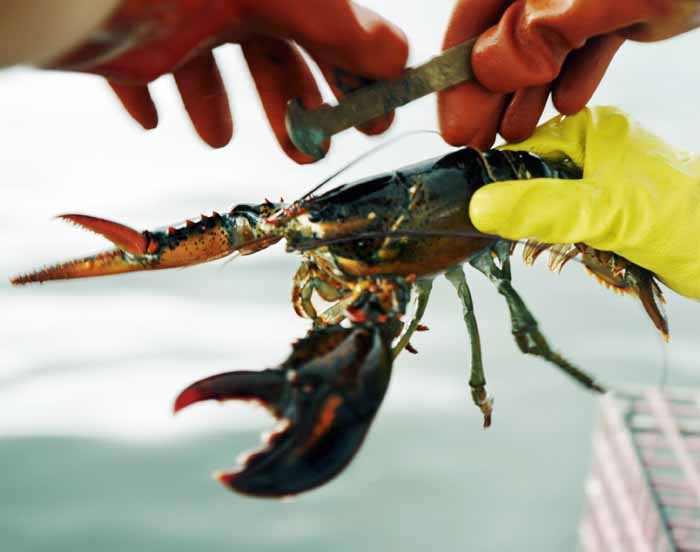PORTLAND — Huge lobsters that once went to waste are now being turned into meat and tails under new state regulations that went into effect today.
The new regulations roll back restrictions that had forced Maine lobster processors to follow the same size limits as the state’s fishermen, even on lobsters caught outside the state. The new rules allow the processors to turn the oversized lobsters, most of which come from Canada, into products sold to restaurants and retailers.
Maine lobster dealers and processors import millions of pounds of lobster each year, much of it during the cold-weather months when Maine lobstermen stop hauling their traps and the Canadian lobster season is in full swing.
The out-of-state shipments often arrive ungraded, with many of them containing lobsters bigger than the 4½ to 5 pounds that can be legally caught in Maine, said John Hathaway, owner of Shucks Maine Lobster company in Richmond.
Barred from processing the big crustaceans and unable to find out-of-state buyers for them, lobster companies often simply left the lobsters to die. The financial losses ended up costing them hundreds of dollars or more a day, Hathaway said.
“We just want to turn it into something other than a loss,” he said.
Hathaway said a 10,000-pound shipment from Canada might contain 100 to 200 pounds of oversized lobsters, the biggest of which might weigh as much as 15 pounds. It’s hard to market such a small amount of odd-sized, big lobsters, he said, meaning processors simply ate the profits.
“If you lose $5 a pound on 200 pounds, that’s $1,000,” Hathaway said. “It was an expensive nuisance.”
Maine has strict lobster conservation laws that prohibit the catching of lobsters bigger than a specified size, as measured by shell length. The size limits, which prescribe both a minimum and maximum catch size, are designed to protect breeding stocks.
The Legislature passed the new processing law in the spring, despite the opposition of the Maine Lobstermen’s Association, the state’s largest lobster harvester organization.
The lobstermen think processors should abide by the same restrictions under which they operate. Allowing processors a loophole might weaken Maine’s reputation for sustainability, they said.
“We testified against it because we didn’t think it was a good idea,” said David Cousens, a South Thomaston lobsterman and president of the Maine Lobstermen’s Association. “But they passed it, so we’re not making a big deal about it.”
The law affects only eight companies in Maine, said Col. Joe Fessenden, deputy commissioner of the Department of Marine Resources. Rather than lose money on lobsters that often end up dying, those companies can now turn them into a marketable product, he said.
“This at least lets them recover some of their money back,” Fessenden said.
The law expires in two years because of a sunset clause, meaning it will need to be reapproved by the Legislature for it to stay in place.
Send questions/comments to the editors.



Success. Please wait for the page to reload. If the page does not reload within 5 seconds, please refresh the page.
Enter your email and password to access comments.
Hi, to comment on stories you must . This profile is in addition to your subscription and website login.
Already have a commenting profile? .
Invalid username/password.
Please check your email to confirm and complete your registration.
Only subscribers are eligible to post comments. Please subscribe or login first for digital access. Here’s why.
Use the form below to reset your password. When you've submitted your account email, we will send an email with a reset code.